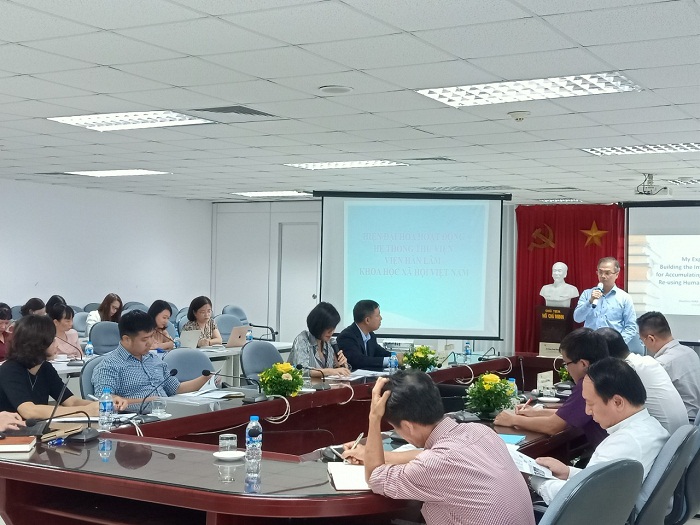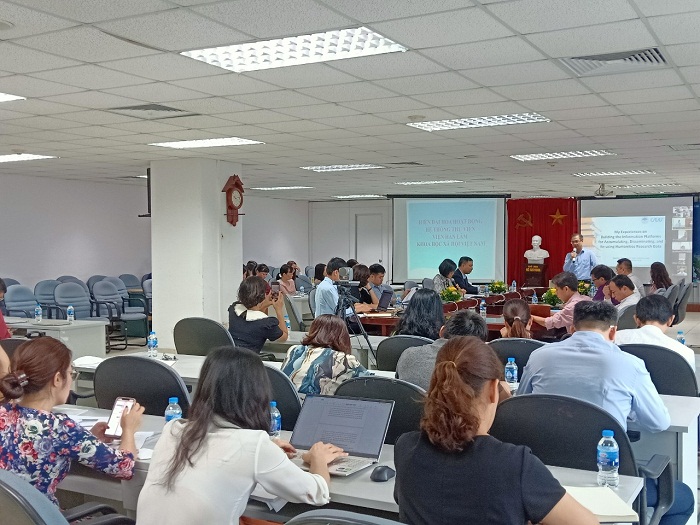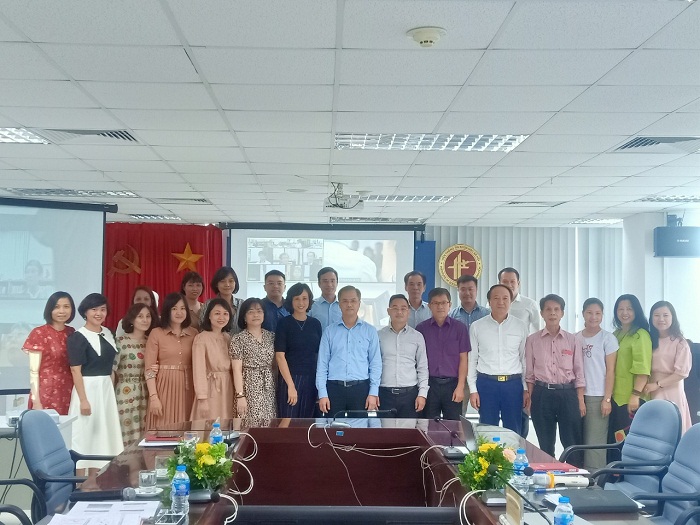
Speaking at the opening ceremony, Dr. Dang Xuan Thanh warmly thanked the presence of all delegates; the presentation of Prof. Shoichiro Hara (Kyoto University) with discussions on sharing experiences on building shared databases and Mydatabase data for scientists. The Vice President hoped that the discussion would suggest more specific directions for VASS in implementing digital transformation plans in the fields of social sciences and humanities.
Prof. Shoichiro Hara gave a very detailed presentation (online from Kyoto University, Japan) about the steps taken in the research and creation of a database system for internal use and data of scientists in Japan, introducing an overview of this software, emphasizing the standardization of the process, the steps of research and evaluation, data creation, data publishing, and sharing (data sharing) on the Internet environment. He also emphasized that this is an important step to start building a shared database; and believed that the data builder's task is to gather the necessary data sources to provide to the end users, combined with the selected technology platform (used) and must answer this question to be able to develop a shared base system and contribute to the national database system.
In addition to a detailed comparison of the differences in building shared database with building Mydatabase in terms of popularity/ personal/ individual/ collective/ consistent data storage/ specification/ common software/ private software, Prof. Hara shared: scientists' (private) data is gathered into data fields (normalized), digitized and uploaded to Mydatabase. Since then, it has been built into a specialized database system for research in the humanities and social sciences. This is a shared data system from which scientists can reverse access and use this resource for different research purposes without knowing about technology, database system. And digital transformation are a huge support for the development of this science in the future and also is a task that must be done immediately with standardized direction from the national level.

Currently, the Library of Information Institute owns about 1,400,000 titles/ names of documents (corresponding to over 2,200,000 document units) of more than 10 types of information resources including: books, newspapers, magazines, specialized research reports, dissertations, theses, paintings, photographs, maps, drawings, stamps, tapes, microfilm and some online databases purchase access.
With 02 projects to modernize library activities implemented in the period 2015-2018 and 2018-2019 on building an electronic library system - a digital library - data bank and building & developing a data bank for an electronic library system - centralized digital library, the work of library modernization has gradually achieved very positive results. Although there are still some difficulties in creating a data bank, such as no periodic skills training courses, no access management software, no firewall, and no consistent service policy leads to units that do not dare to download documents on digital library software, do not have the funds to digitize documents in bulk or invest in buying online databases. However, based on the digitization orientation that needs to be implemented in the near future, the library system of the VASS is aiming to comply with the digital transformation strategy and plan in the next period to inherit and promote the operational efficiency of the VASS's electronic - digital library system; strengthening the digital transformation capacity of the library system to serve a large number of researchers, lecturers, students and the science-loving community...

Dr Dang Xuan Thanh emphasized the importance of learning the model of creating a database system, especially a database system for My database scientists from sharing the experience of Prof. Hara, Kyoto University. At the same time, he also said that digital transformation is a long journey with many endogenous difficulties from the Academy related to institutions, policies, human resources, infrastructure, implementation plans, index measurement... but it is a must-do task that the VASS needs to perform in the coming time. The sharing of Prof. Hara is the necessary suggestion for VASS to use as a basis for developing a digital transformation plan and building scientific databases; thereby creating favourable conditions in professional activities and sharing information on technology platforms, actively and effectively contributing to the sustainable development of the humanities and social sciences.
Pham Vinh Ha







